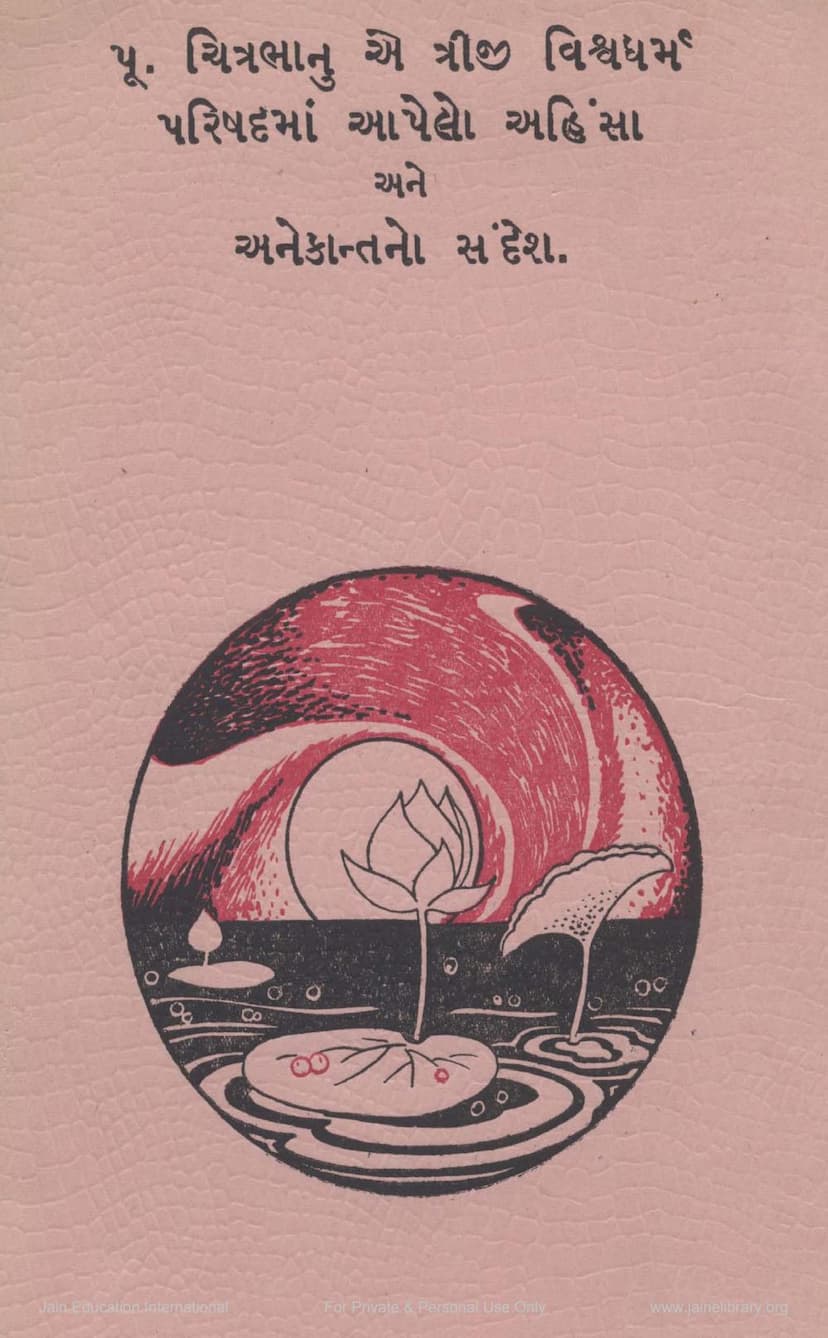Chitrabhanuji No Ahimsa Ane Anekant No Sandesh
Added to library: September 1, 2025

Summary
This document is a Gujarati-language text titled "Chitrabhanuji no Ahimsa ane Anekant no Sandesh" (The Message of Ahimsa and Anekanta by Chitrabhanuji). It documents the travels and lectures of Pujya (Revered) Muni Chitrabhanuji in America, focusing on his message of Ahimsa (non-violence) and Anekanta (multi-sidedness of reality).
Here's a comprehensive summary of the key points presented in the text:
1. Pujya Muni Chitrabhanuji's Role and American Tour:
- A Messenger of Indian Spirituality: The text highlights that Pujya Muni Chitrabhanuji is a significant Indian philosopher and spiritual leader who has had the rare opportunity to address international spiritual conferences multiple times, including in Geneva and Cambridge.
- Bridging East and West: His American tour is presented as a crucial step in conveying India's spiritual message of Ahimsa and Anekanta to a materialistic Western world that, despite its material prosperity, yearns for spiritual fulfillment.
- Breaking Traditions: The document notes that Muni Chitrabhanuji was likely the first Jain muni to travel internationally and participate in global conferences. This broke with traditional Jain practices that restricted monks from using modern transportation like airplanes, a decision that initially caused a stir within the Jain community.
- Impact and Reception: His speeches and presence captivated not only American citizens but also academics like deans and professors. His message was met with great interest and appreciation, with audiences deeply moved by his wisdom and compassionate demeanor. He received numerous invitations to speak across America, solidifying his fame.
2. The Core Messages of Ahimsa and Anekanta:
-
Ahimsa (Non-Violence):
- Root of Violence: Muni Chitrabhanuji attributes violence to ignorance, fear, prejudice, and the lust for power and wealth.
- Beyond Physical Non-Violence: Ahimsa is presented not just as abstaining from killing, but as a broader concept of respect and compassion towards all living beings in all their forms. It involves cultivating love and empathy for all life.
- Personal Responsibility: He emphasizes that to achieve world peace and end violence, individuals must cultivate self-control and restraint in their actions, starting with small, everyday acts. This begins with training children in honesty and integrity.
- Futility of Fear for Peace: He refutes the notion that peace can be maintained through mutual fear, stating that fear breeds negativity and cannot lead to lasting tranquility.
- Vegetarianism (Niramiṣāhāra): The message of vegetarianism is strongly advocated as a practice rooted in Ahimsa, preventing the killing of animals for food and alleviating their suffering. He posits that food choices impact not only physical well-being but also the mind and moral character.
-
Anekanta (Multi-sidedness):
- Understanding Diverse Perspectives: Muni Chitrabhanuji explains that Anekanta teaches that reality has multiple facets. We often only see one side, leading to limited understanding.
- Tolerance and Empathy: By understanding that all knowledge is partial and limited, and that there are many paths to truth, individuals can learn to understand and appreciate different viewpoints, even if they don't agree with them. This fosters tolerance and better understanding between people of different faiths and ideologies.
- Combating Dogmatism: He criticizes the narrow-mindedness and dogmatism that arises from partial knowledge, which can lead to rigidity and intolerance. He advocates for embracing the multifaceted nature of truth to overcome such limitations.
3. Broader Themes and Observations:
- The Paradox of Modern Life: The text highlights the inherent contradictions in modern life, where humanity desires progress but often retreats, creating a dissonance that leads to confusion and conflict.
- The Role of Wisdom: While the 20th century has seen a proliferation of knowledge, Muni Chitrabhanuji laments the scarcity of wisdom, emphasizing the need for knowledge to be coupled with insight and understanding.
- Human Agency: He asserts that humans are the architects of their own destiny, rather than divine intervention. He points to the power of human decisions to bring about significant change, even ending wars.
- The Limitations of Materialism: The book strongly argues that material progress alone cannot bring true happiness. It contrasts the fleeting nature of material success with the lasting fulfillment found in spiritual growth.
- The Importance of Inner Transformation: Muni Chitrabhanuji stresses that external efforts for peace are insufficient if the internal landscape of humanity remains filled with animosity and violence. True change must come from within, through the internalization of knowledge and spiritual principles.
- Art and Spirituality: He connects art with spiritual development, suggesting that art can help elevate human senses and instincts, leading to spiritual growth and a more joyful existence.
- The Need for Simplicity and Self-Control: His simple attire and disciplined lifestyle exemplify the Jain principles of self-control and detachment from material possessions.
- Universal Appeal of Jain Principles: The document suggests that Jain principles, particularly Ahimsa and Anekanta, have universal relevance and can offer solutions to contemporary global challenges.
- A Cultural Journey: The tour is framed not merely as a religious propagation but as a cultural exchange and a testament to the enduring spiritual wisdom of the East.
In essence, "Chitrabhanuji no Ahimsa ane Anekant no Sandesh" chronicles the impactful journey of Muni Chitrabhanuji to America, where he eloquently presented the Jain philosophy of non-violence and multi-sidedness. His message resonated deeply with audiences, offering a spiritual counterpoint to Western materialism and highlighting the timeless relevance of Indian wisdom for fostering global peace and understanding.